UM, Peng Cheng Laboratory initiate collaboration in AI, network and communication
澳大與鵬城實驗室開展人工智能網絡通信合作
21 Apr 2020
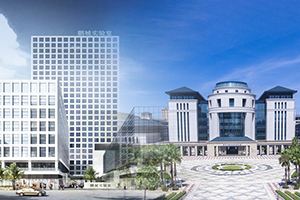
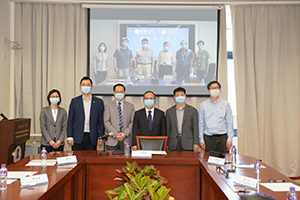 UM and Peng Cheng Laboratory initiate collaboration in AI, network and communication
UM and Peng Cheng Laboratory initiate collaboration in AI, network and communication澳大與鵬城實驗室開展人工智能網絡通信合作
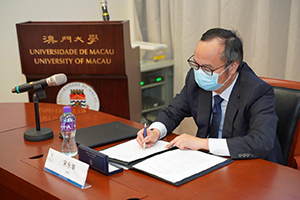 Representatives of UM and Peng Cheng Laboratory in Guangdong sign a strategic collaboration agreement
Representatives of UM and Peng Cheng Laboratory in Guangdong sign a strategic collaboration agreement宋永華代表澳大與鵬城實驗室簽署戰略合作框架協議
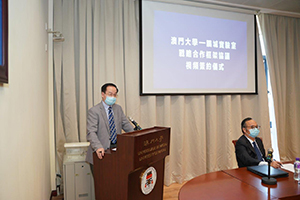 Ge Wei gives a speech
Ge Wei gives a speech葛偉致辭
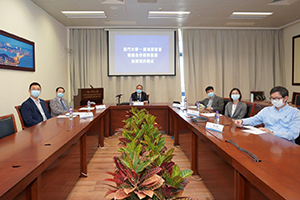 Both parties sign a collaboration agreement via video conferencing
Both parties sign a collaboration agreement via video conferencing雙方進行視頻簽約儀式
The University of Macau (UM) and Peng Cheng Laboratory in Guangdong province recently signed a strategic collaboration agreement via video conferencing, marking the beginning of a long-term strategic collaborative relationship that will combine the strengths of both institutions. According to the agreement, both parties will conduct collaborative research in artificial intelligence (AI), network and communication, cyberspace security, and robotics. The partnership also reflects the determination of both parties to carry out cross-regional cooperation in scientific research during the epidemic.
At the ceremony, Yonghua Song, rector of UM, and Gao Wen, director of Peng Cheng Laboratory, signed a strategic collaboration framework agreement on behalf of UM and Peng Cheng Laboratory, respectively. Peng Cheng Laboratory is a laboratory approved by the government of Guangdong province and established by the government of Shenzhen city. Dedicated to serving the needs and strategic layout of the country and Guangdong province, the lab conducts regional and multi-disciplinary, interdisciplinary, and large-scale collaborative basic research and applied basic research projects. It mainly focuses on three research fields, namely AI, network and communication, and cyberspace security. The lab has initiated eight key research projects and will gradually develop related scientific research platforms. The lab also collaborates with national key laboratories in related fields, with the aim of maximising their strengths. The lab strives to take the lead in China's science and technology development and become a force behind the country’s strategic development in this field.
According to Ge Wei, vice rector (research) of UM, under this agreement, UM and Peng Cheng Lab will jointly carry out major scientific research projects to meet the needs of national and social development; they will also study basic, forward-looking, and strategic theoretical issues, as well as develop core technologies. Both parties will use their strengths to enhance communication and mutual visits related to specific projects, strengthen exchange of researchers, promote the commercialisation of both institutions’ research results, enhance the competitiveness of China’s scientific and technological industry, as well as research achievements in AI, network and communication, cyberspace security and robotics.
According to Zou Peng, executive deputy director of Peng Cheng Laboratory, the lab is committed to carrying out strategic cooperation and implementing the concept of co-construction since its establishment two years ago. Currently, there are more than 150 strategic cooperation units in the lab, which jointly carry out major scientific research projects and develop scientific research platforms.
With the rapid development of science and technology, Macao is also vigorously promoting the development of science and technology to establish a new development model of ‘Building a better Macao through science and education’. With the strong support of the central government, Macao SAR government, and people from all sectors of society, UM has taken as its responsibility to support the government’s effort to build a better Macao through science and education. The university carries out interdisciplinary collaborations, focuses on its strength areas, strengthens collaboration in scientific research and the commercialisation of research results, and actively supports the development of Macao and the Guangdong-Hong Kong-Macao Greater Bay Area. In recent years, UM has made rapid progress in scientific and technological innovation. It is now ranked among the top 1 per cent in the Essential Science Indicators (ESI) database in seven disciplines. Over the years, it has produced a large number of outstanding graduates for Macao and the country. The university has also established a ‘3 + 3 + 3’ strategic layout for scientific research and vigorously promotes interdisciplinary research. For instance, the university’s State Key Laboratory of Internet of Things for Smart City and Joint Laboratory of Artificial Intelligence and Robotics conduct cutting-edge research in fields such as artificial intelligence, network and communication, cyberspace security, and robotics, and have achieved remarkable results.
UM representatives attending the ceremony included Xu Chengzhong, dean of the Faculty of Science and Technology; Yang Zhixin, director of the Research Services and Knowledge Transfer Office; as well as professors Gong Zhiguo and Ma Shaodan from the State Key Laboratory of Internet of Things for Smart City. Representatives of Peng Cheng Laboratory included Chen Changwen, deputy director of the lab; Wang Lixin, head of the Office of General Affairs; Gary Li, director of the Artificial Intelligence Research Centre; Qui Jingfei, deputy director of the Artificial Intelligence Research Centre; Chen Yupeng, executive assistant of the Artificial Intelligence Research Centre; and Kou Hongning from the Office of International Affairs.
澳門大學與廣東省鵬城實驗室通過視頻舉行“澳門大學—鵬城實驗室戰略合作簽約儀式”,標誌著雙方將基於優勢互補、長期合作的原則,建立戰略合作關係。雙方將圍繞人工智能、網絡與通信、網絡空間安全和機器人技術的研究開展合作;同時,是次合作也體現出雙方在疫情考驗下,仍積極開展跨地區的科研合作和交流。
儀式上,澳門大學校長宋永華和鵬城實驗室主任高文分別代表雙方簽署戰略合作框架協議。鵬城實驗室為一家由廣東省政府批准設立,深圳市政府撥款組建的實驗室。實驗室以服務國家和廣東省重大需求和戰略佈局為己任,開展區域性多領域、跨學科、大協同的基礎研究和應用基礎研究,部署了三個主要研究方向,分別為人工智能、網絡通信及網絡空間安全,當中開展了八個重點項目,並逐步規劃建設相關科研平台。實驗室亦與相關領域國家重點實驗室協同合作,充分發揮國家重點實驗室的優勢,力爭成為引領科技進步、引領未來發展的國家級戰略科技力量。
澳大副校長(研究)葛偉致辭表示,透過澳大與鵬城實驗室合作,雙方共同承擔重大科研任務,配合國家和社會發展需要,研究具基礎性、前瞻性、戰略性的理論問題,開發核心技術。雙方圍繞各自的優勢開展合作,加強專題工作對接和互訪,強化科研人才的交流,促進雙方科技成果的轉化,提升國家的科技產業競爭能力,強化人工智能、網絡與通信、網絡空間安全和機器人技術的研究。
鵬城實驗室常務副主任鄒鵬致辭表示,實驗室成立兩年來,致力開展戰略合作,實行共建理念,與廣東深圳地區、粵港澳地區及國內外科研組織建立了廣泛的戰略合作關係,目前實驗室共有一百五十多家戰略合作單位,共同進行重大科研項目,開展科研平台的建設。
全球科技發展日新月異,澳門也正下大力推動科技發展,形成“科教強澳”的發展新模式。澳大在中央及特區政府的大力支持和社會各界的關心下,以科教強澳為己任,開展跨學科合作,聚焦優勢領域,加強科研合作及成果轉化,積極助力澳門和粵港澳大灣區的規劃建設。近年來,澳大在科技創新方面取得快速發展,目前已有七個學科進入了基本科學指標資料庫世界前1%,為澳門和國家培養了大量的人才。同時,大學更確立了 “3+3+3”的科研戰略佈局,大力推動跨學科研究。其中,智慧城市物聯網國家重點實驗室和跨學科的人工智能與機器人中心圍繞人工智能、網絡與通信、網絡空間安全和機器人技術等相關領域,開展前沿科學研究,取得了顯著的成效。
出席儀式的澳大代表還有科技學院院長須成忠、研究服務及知識轉移辦公室主任楊志新、智慧城市物聯網國家重點實驗室教授鞏志國和副教授馬少丹,以及鵬城實驗室代表有副主任陳長汶、綜合辦公室負責人王立新、人工智能研究中心主任李革、人工智能研究中心副主任邱景飛、人工智能研究中心主任助理陳玉鵬、國際合作辦寇宏寧。
